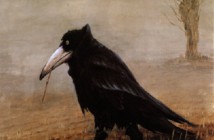Back in 1954, when Elvis broke big and deejay Alan Freed coined the term rock n’ roll America’s good ol’boys were down at the levee with their girlfriends drinking whisky and rye. The party ended in 1962 with the British pop music invasion. It would take another decade for America to wake up to the fact that their music got de-Americanized.
Don McLean’s evergreen “American Pie” was a chart topper in 1972, offering a rear view mirror on the demise of true American pop, a decade after the fabled British invasion. The song was seen as an ode to changing values as Vietnam and the Flower Power era segued into the Watergate era.
McLean says he was disturbed as a youth by the tragic deaths of his idols Buddy Holly and The Big Bopper and that the lyrics to “American Pie” reflect that.
He was a fresh, clean face in a music scene that was sullied by the heroin deaths of Jimi Hendrix and Janis Joplin. A counterpoint to the British invasion, which included The Beatles, The Rolling Stones, Hermans Hermits and countless other groups.
Drilling down, though, “American Pie,” like The Mike Curb Generation and Up With People, represented an early attempt to align rock music with religious values. In an obleik reference to The Rolling Stones “Sympathy For The Devil” album, for example, McLean penned the lyric in “American Pie”… “fire is the devil’s own defense… no angel born in hell could break that Satan’s spell.” His lyric also noted my friends, “the father, son and holy ghost caught the last plane for the coast, the day the music died.”
This is one reason McLean is not in the Rock and Roll Hall of Fame, but is now a member of the Songwriters Hall of Fame. His reaction to finally being elected after 40 years in the business… “Game Over, I Win.”
Because McLean’s style was on the bubble between straight pop and the so-called alternative folk and folk rock incubators in Cambridge, Chicago’s Old Town, Greenwich Village and the 1960s San Francisco scene, the depth of his lyrics was overlooked by most mainstream writers. Most dwelled on the lamentations inherent in “American Pie.” Alternative rock critics at the “underground” publications of the time, like the early Rolling Stone and The Village Voice, did not regard McLean as one of theirs and treated him accordingly.
They preferred to iconize Bob Dylan after bleaching red out of the folk scene and then saw god after making a right on the a hot motorcycle. Jim Morrison was busy flashing the girls during concerts while cancelling his subscription to the resurrection. And millionaire chansonnier Leonard Cohen was waxing poetic about tea and oranges in Greece while the U.S.-backed military junta was waterboarding students protesting in the Plaka who bought his songs. The Temptations crossed over into the white market, capturing the mood with their “Ball of Confusion.” McLean could have topped that with “Ball of Contradictions.” But he stayed the course and followed his own song.
With the music industry hungry for a new face from middle class America to capture the heartland, McLean filled the market gap. As a young songwriter who tapped success in the easy listening market McLean was already penning easy tunes that became hits for the likes of Perry Como.
Knowing that McLean, like country and movie icon Kris Kristofferson, had the “right stuff,” his management team launched a carefully crafted image of an artist who had a great, trained voice and could really sing as the great American troubadour. A far different schtick than the Woodie Gurthrie clone that was Bob Dylan’s stairway to the stars.
McLean as a teen hooked up with the Weavers and Pete Seeger. He even got funding from the Nelson Rockefeller-era New York Council On The Arts.
In fact, McLean and his anthem to America was another slick product of a music business star system that turned out entertainers just like Hollywood. The good part is that he helped America look inside itself at a time when introspection was badly needed.
There were others more rad than McLean who pushed the envelope. Phil Ochs, the folk singer out of Ohio State University who became a legend for his Vietnam Era tune “I Ain’t Marchin’ Anymore” and then committed suicide due to adaptation problems.
Tim Hardin, the Vietnam veteran who penned classics “If I Were A Carpenter” and “Reason To Believe” and checked out do to heroin demons that had darkened his soul since his time as a Marine adviser in Nam.
Don McLean remains himself: resilient, the consummate professional. His sidemen as tight as the Band and Van Morrison’s bands ever were. Some critics say his late career rendition of Roy Orbison’s “Crying” is equal to or better than Orbison’s. McLean’s voice has never lost it.
Perhaps his one cynical revelation is that once, when asked about the real meaning of “American Pie” is, he said “that I don’t have to work anymore.” In today’s version of America that’s a message that resonates big time.

